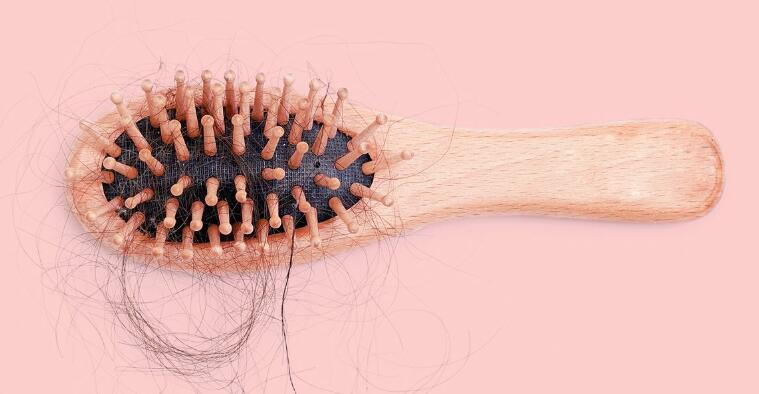Genetics (Androgenetic Alopecia):
Genetics is the most common cause of hair loss, especially in conditions like androgenetic alopecia (also known as male or female pattern baldness). This type of hair loss is inherited and occurs when hair follicles become more sensitive to dihydrotestosterone (DHT), a derivative of testosterone.
In men, it typically leads to a receding hairline or bald spots, while in women, it often causes diffuse thinning on the top of the scalp.
This type of hair loss usually starts in early adulthood and progresses gradually over time.
Minoxidil: Promotes hair regrowth.
Finasteride: A prescription medication that blocks DHT

Hormonal Imbalances:
Hormonal fluctuations are a major contributor to hair loss, particularly in women. This can occur during significant life changes like pregnancy, childbirth, menopause, or from disorders affecting the thyroid or ovaries (e.g., polycystic ovary syndrome or PCOS).
Thyroid disorders (both hypo- and hyperthyroidism) can cause thinning or shedding of hair. The thyroid hormone helps regulate the hair growth cycle, so any disruption can impact hair health.
Androgens (male hormones) play a role in hair thinning, particularly in women with conditions like PCOS, where excess androgens are produced, leading to thinning hair and increased body hair.
Post-pregnancy: After childbirth, many women experience temporary hair shedding due to the dramatic shift in hormones, which typically resolves within a few months.
DHT Blockers: Finasteride or natural alternatives like saw palmetto.
Hormonal Treatments: Consult a healthcare provider for options like birth control pills that may help.
Stress:
Emotional or physical stress can lead to a type of hair loss called telogen effluvium. During times of stress, the body may push hair follicles into a resting phase (telogen), leading to excessive shedding.
Stress can also exacerbate other conditions like alopecia areata (an autoimmune condition) or worsen the effects of androgenetic alopecia.
Chronic stress can disrupt the hair growth cycle and may contribute to long-term thinning.
Biotin Supplements: Support overall hair health.
Scalp Treatments: Products containing ingredients like saw palmetto or rosemary oil may help.
Nutritional Deficiencies:
Iron deficiency (anemia), vitamin D deficiency, and lack of essential vitamins and minerals like zinc and biotin can impair hair growth. Malnutrition or restrictive diets can cause hair to shed prematurely and may prevent new growth.
Protein deficiencies can also impact hair health, as hair is primarily made of protein (keratin).
Medications and Medical Treatments:
Certain medications, like those used in chemotherapy, beta-blockers, antidepressants, or blood thinners, can cause temporary or permanent hair loss.
Birth control pills or hormone replacement therapy can also influence hair thickness due to changes in hormone levels.
Retinoids and other prescription medications may also have side effects that lead to thinning or shedding.
Autoimmune Conditions (Alopecia Areata):
Alopecia areata is an autoimmune condition where the body’s immune system attacks hair follicles, causing sudden, patchy hair loss. It is often triggered by stress, infection, or other factors that influence the immune system.
Scalp Conditions:
Fungal infections (like ringworm), seborrheic dermatitis, and psoriasis can affect the scalp and cause hair loss due to inflammation or infection.
Dandruff or excessive oil buildup can clog hair follicles, leading to reduced hair growth or shedding.
Age:
Aging naturally leads to hair thinning due to a decrease in hair follicle size and a reduction in the number of active hair follicles. As you age, hair may grow thinner and more slowly, and the growth phase of the hair cycle becomes shorter.
Environmental Factors:
Environmental toxins, exposure to chemicals, or excessive use of hair styling products can damage the hair shaft and contribute to hair loss over time.
Heat styling tools and harsh chemical treatments like dyes or relaxers can weaken hair and lead to breakage or thinning.
Traction Alopecia:
Traction alopecia is a type of hair loss caused by excessive tension on the hair, often from tight hairstyles such as braids, ponytails, or buns. If left untreated, this can lead to permanent hair loss in affected areas.
Other Factors:
Underlying health conditions, such as diabetes, lupus, or anemia, can cause or contribute to hair thinning.
Excessive smoking or alcohol consumption can also contribute to hair loss by impairing circulation and nutrient absorption.
Conclusion:
Hair loss can be caused by a combination of factors, with genetics, hormonal imbalances, and stress being among the most common. To address hair loss, it’s important to first identify the underlying cause, whether through blood tests, medical examination, or lifestyle changes. Consulting a healthcare provider or dermatologist can help determine the appropriate treatment plan tailored to the cause of hair loss.